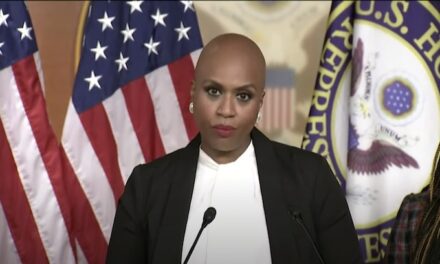Ten Republicans in the House of Representatives changed their votes on the bill that codifies protections for same-sex marriage, a measure that has drawn fierce criticism from some groups over the endangerment of religious liberty.
H.R. 8404, known as the Respect for Marriage Act, was passed by the House in July and again on Dec. 8 following amendments in the Senate. The legislation would repeal the Defense of Marriage Act, a 1996 law that said marriage was a union between a man and a woman, and codify the Supreme Court’s 2015 ruling that deemed the law unconstitutional and required states to license gay marriage.
Republicans who initially voted yes but changed to no are: Reps. Cliff Bentz (R-Ore.), Mario Diaz-Balart (R-Fla.), Brian Mast (R-Fla.), Dan Meuser (R-Pa.), Scott Perry (R-Pa.), Maria Elvira Salazar (R-Fla.), and Jeff Van Drew (R-N.J.).
Reps. Mike Gallagher (R-Wis.) and Jaime Herrera Beutler (R-Wash.) initially voted no, but voted yes on Thursday.
And Rep. Burgess Owens (R-Utah) changed his initial yes vote to present.
Bentz and Herrera Beutler did not issue statements on why they changed their votes and their offices did not respond to requests for comment.
Lack of Safeguards
The members who spoke out about changing from yes to no said they were concerned about what they described as a lack of safeguards for religious groups that hold to a marriage being between one man and one woman.
“It is unfortunate that the Senate missed an opportunity to protect marriage equality while also guaranteeing religious freedom. After multiple efforts by my colleagues to offer amendments, Senate Democrats rejected each amendment and doubled down on a bill that fails to uphold the religious liberties which are sacred to our nation,” Diaz-Balart said in a statement.
Senators in November rejected a trio of amendments that proponents said would protect religious freedom.
One, from Sen. James Lankford (R-Okla.), would have protected individuals and entities from repercussions for not supporting same-sex or interracial marriages.
Mast said on the House floor that members take an oath to defend the Constitution and felt the law violated the sacred document while panning how Democrats blocked consideration of amendments because of concern that altering the legislation would “unsettle” the version the Senate approved.
Meuser said that the Senate version, unlike the original version, “includes language that puts religious freedoms in jeopardy and opens up organizations to civil suits.”
Salazar offered a similar view.
“I am disappointed to see the final House version of the Respect for Marriage Act did not include full protections for churches and Americans with sincerely held religious beliefs. I voted for the first version of the bill because I believe in human dignity and respect for all individuals. However, we cannot pass laws that advance one interest and bypass long-held legal protections for others,” she said in a statement. “Unfortunately, Senate Republicans were prevented from including vital protections for religious Americans in the version that passed, including the Rubio and Lee Amendments. We must uphold the rights of all Americans and protect our religions institutions and faith community.”
Van Drew told NJ Advance Media: “This really has the potential to do harm. Somebody else that has to do something or make a statement against his or her religion is not protected.”
Perry told Axios of his initial vote: “I walked on the floor as the vote was happening, I knew I had a choice between voting against traditional marriage or voting against interracial marriage, I just made the wrong choice.”
A number of lawmakers said they heard from constituents who wanted them to vote against the bill.
Owens said he shifted from supporting the bill to answering present because there wasn’t “explicit protection” for people and small business owners.
‘Loophole’ Fixed
Gallagher, one of the few Republicans to change from an initial no vote to a yes vote, said that the Senate clarification on polygamy was the impetus.
An amendment stated that the act must not be read as supporting marriages between more than two people.
“The Respect for Marriage Act fixes the polygamy loophole in Speaker Pelosi’s hastily written version and creates strong religious liberty protections for religious organizations, including schools, churches, and adoption agencies,” Gallagher said in a statement. “It also moves more of the issue of marriage to the states—where I believe it belongs.”
Biden to Sign
Since the House and the Senate passed the bill, all that’s left is for President Joe Biden to sign it.
The date for that to happen has not yet been announced.
Biden said in a statement this week that “Congress took a critical step to ensure that Americans have the right to marry the person they love” and that the passage of the law “will give peace of mind to millions of LGBTQI+ and interracial couples who are now guaranteed the rights and protections to which they and their children are entitled.”



















Reps. Mike Gallagher (R-Wis.) and Jaime Herrera Beutler (R-Wash.) both need to get voted out, for this treason!
We the Christian voters need to rid the GOP of this sizable portion of Republican RINOs in Congress. Vote these RINOs out of congress!!!
The leadership can ameliorate the chasm by listening to or better accommodating the rank-and-file, or the organization will cease to exist.
Because for the GOP, the status quo is simply unsustainable.